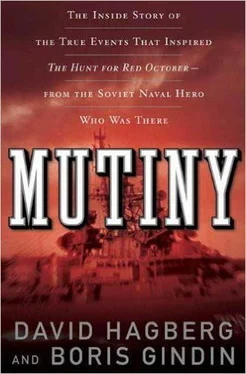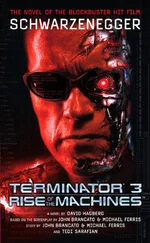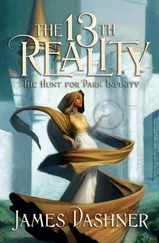“I don’t appreciate your joke,” Gindin tells the man. “Get out of bed now.”
Several of the seaman’s crewmates have remained behind to watch from the open door. It is the officer against the new troublemaker.
“I have told you that my father is an alcoholic and I have a hangover. Now go away and let me alone.” Fomenko turns over in bed. He means to disobey a direct order.
Gindin glances at the men watching the unfolding drama. He is not a hard man. He does not have a bad temper, as some of the other officers do. He does not treat his men harshly. But he does expect his orders to be obeyed. This is important to him, and to the ship, and especially to the Soviet navy, to which he owes his entire future.
Gindin throws back the thin blanket, grabs Fomenko by the collar of his shirt, hauls him roughly out of bed, and slams him against the wall. “Do you feel better now?”
“No,” the seaman says. He is provoking Gindin to take the situation to the limit or leave him alone, in which case the men will have won a small battle against an officer.
Gindin smashes the seaman against the steel bulkhead again, this time with much greater force. “How do you feel now?” Gindin asks.
“Better but not good enough.”
Gindin lifts the man’s feet completely off the floor and smashes him against the wall again, his head bouncing off the steel. “How about now?”
“I feel much better, sir,” Fomenko says. He is ready to go on deck for morning exercises.
The seventeen men from the motor turbine division make their way topsides, where they join their comrades. Thirty minutes of exercise every morning, seven days per week, at anchor or at sea, rain or snow or shine. Curiously, despite the bland, monotonous food in the crew’s mess and despite the fact that no matter the weather the men dress only in trousers and cotton shirts, no one gets a cold or the flu. These boys are healthy, most of them from the farms or small towns across the Soviet Union, with iron constitutions.
Every morning after exercises the enlisted men are served kasha, which is a gruel made of hulled buckwheat, and a couple thin pieces of bread with a little butter, while the officers are served a special kasha made of processed oatmeal, cheese, kielbasa sausages, and as much good bread and butter as they can eat.
After making sure that his men show up for their exercises Gindin walks forward to the officers’ dining hall on an upper deck. It’s about twenty-five feet long and half that width, with three long tables and two big windows. It is a bright, airy room, something Gindin appreciates, since his duty station is belowdecks in the machinery spaces. The table to the left is for the skipper, Captain Second Rank Anatoly Potulniy; his starpom, executive officer, Captain Lieutenant Nikolay Novozilov; and the zampolit, political officer, Captain Third Rank Valery Sablin; plus any visiting VIPs.
This is the end of a six-month cruise, which has taken them as far around the world as Cuba, to show the flag, to show support for a friendly nation. Tomorrow the Storozhevoy, which in English translates very unsexily into “large patrol craft,” is scheduled to sail to the Yantar Shipyard in Kaliningrad, where he will undergo two weeks of repairs, and then back to base at Baltiysk, fifty kilometers away.
Gindin’s family lives in Pushkin, about twenty-five kilometers south of Leningrad, and it’ll be good to get home on leave, because he’s just lost his father, Iosif, with whom he was very close. His dad’s death was a real blow, which he is having a hard time dealing with. He wants to be morose, but he can’t let himself slide into self-pity and still do his duties. But two weeks will not be soon enough for him to be with his mother, Yevgeniya, and sister, Ella, who need him.
Boris’s roommate, Senior Lieutenant Vladimir Firsov, is at the breakfast table when Gindin walks in and takes his place. The captain’s not here this morning, but Zampolit Sablin is, and it looks as if he has a fire in his belly.
“Good morning, Boris,” Sablin calls with a lot of bonhomie. “It’ll be a fine day, don’t you think?” He’s got dark hair, a good build, and the kind of face that is always smiling.
Gindin remembers an incident when the ship sailed down to East Germany for a celebration of the thirtieth anniversary of the end of World War II. A parade had just passed by, and everybody on the pier was happy. Gindin and Sablin and some of the other officers went down on the dock, and Sablin scooped up one of the children and held the kid high in the air with a big smile. Everyone was laughing and singing. Sablin was married and had a child of his own, and he liked all children. But Gindin wasn’t married, had no children, and didn’t understand. Except that Sablin has the same happy, excited look on his face this morning as he had in Germany that day.
“What’s with our good zampolit?” Firsov asks. He’s five-nine, with blond hair, a mustache, and a wicked kick on the soccer field. He’s a bright guy. He and Gindin have hit it off.
“He’s always like that,” Gindin says. “He thinks he’s here to save us.”
“From what?” Firsov asks. “Our crazy crew?”
Gindin looks sharply at him, thinking that he was the only one who’d noticed that something strange was going on. Things felt different somehow. It promised to be a bright, crisp weekend, and there was nothing to spoil it. Yet coming up a companionway from belowdecks he ran into some sailors who were in a huddle, having a serious conversation about something. When they spotted an officer coming their way, they broke off.
It was a holiday, when people normally smile and laugh and have happy faces. But this morning Gindin has not seen any smiling sailors; he’s heard no jokes, no laughter.
Only sullenness.
Except from Zampolit Sablin.
The mess steward comes with Gindin’s food. All the officers contribute an extra twenty-five rubles a month for good food, but Gindin has a special relationship with the cook because he controls the ship’s water. It’s the same on all Soviet warships. Some systems in the military seem to work better than others, and this is one of them.
Another involves a pure alcohol, called spirt, which Gindin uses to clean his equipment. It’s 96 proof and when distributed to a friend or to anyone you would like to curry favor with is part of another system that works well.
“After duty we’ll have some spirt,” Gindin suggests to his roommate. “Maybe we’ll figure out what bug Sablin has up his ass.”
Firsov is quick to laugh, and their zampolit, out of earshot, nods his approval. Sablin likes to see his men happy, especially his officers. He has a seemingly genuine interest not only in the crew’s comfort and morale but, curiously, in the ship’s systems as well. All the ship’s systems, mechanical and electrical.
But this morning his mood seems somehow contrived. Maybe false. As if he were afraid of something.
Of what? Gindin wonders.
1967
When Boris Gindin turned sixteen it was time for him to apply for his internal passport, which all Russians need to travel inside their country. It’s also a form of national identification and classification. His mother and father were both Jews. But under “Nationality” her passport was marked “Jewish,” while Iosif’s was marked “Russian.” It meant that Gindin had a choice—to declare himself a Jew or a Russian. His father told Boris to put down “Russian” because when it came time to make a career, life would be much easier for him as a Russian than as a Jew. He was rightfully afraid that the next year, when he was thinking about joining the Soviet navy, he would not be accepted because he was a Jew, unless he followed his father’s advice about the passport. Not that a religion would keep Boris out of the service; it’s just that he knew a Jew would never get into any of the prestigious academies that were necessary for advancement.
Читать дальше












